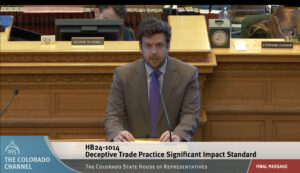Colorado businesses are getting two legal wins at the end of the 2024 legislative session. The Senate on Tuesday approved a negotiated deal on lawsuit damage caps, three days after a committee killed a bill to make it easier to file deceptive-trade-practice lawsuits.
The success of House Bill 1472 is not a surprise, as the damage-caps measure was introduced Sunday with backing from the Colorado Trial Lawyers Association and Coloradans Protecting Patient Access, a group formed to fight two CTLA ballot initiatives. Still, the fact it passed the House Monday on a 55-6 vote and then cleared the Senate unanimously speaks to legislators’ desire to avert a ballot battle over eliminating lawsuit caps on noneconomic damages that business leaders warned could throttle the economy.
However, the lower-profile killing in the Senate Judiciary Committee on Friday of HB 1014, nearly three months after the bill passed the House may be more of a shocker, given the wide margin that Democrats — the party of the bill’s sponsors — hold in the Senate. But for the second year in a row, moderate Democratic Sen. Dylan Roberts of Frisco proved the key vote in the chamber, refusing again to change consumer-protection law in a way that defense attorneys warned could raise prices for a wide variety of goods and services.
In fact, costs of living, arguably the most often-cited issue during debates at the General Assembly this year, lay at the heart of both bills’ fates.
What the damage-caps bill does
HB 1472 came after months of intense negotiations between CTLA, CPPA, the Colorado Chamber of Commerce and the American Property Casualty Association as the two sides threatened to move forward with a combined quartet of ballot issues. CTLA’s proposals would have eliminated caps on noneconomic damage awards and opened peer-review discussions among health-care professionals to discovery in lawsuits, while the CPPA measures would have limits the cost of filings trial lawyers could pass along to clients and the portions of awards those attorneys could keep.

Colorado state Reps. Rose Pugliese and Kyle Brown explain their bill on lawsuit damage caps to the Colorado House.
Sponsored by Democratic Rep. Kyle Brown and Republican House Minority Leader Rose Pugliese, HB 1472 grows noneconomic damage caps on medical-malpractice awards from $300,000 to $875,000 over five years and creates a new wrongful-death claim whose cap will reach $1.575 million in the same period. Also, it hikes caps for general-liability lawsuits from the current level of $250,000 to $1.5 million and boosts the $642,000 cap on noneconomic damages in wrongful-death lawsuits to $2.125 million right away.
The bill drew praise from different parties for different reasons. CTLA President Keri Jones Dulin said it will expand access to justice through legal action. Colorado Chamber President/CEO Loren Furman said the defined caps will avert a potential $2.1 billion hit on the economy that an absence of caps could have caused. And health-care leaders said it will protect rural doctors and specialists whose businesses may have been imperiled had a lack of caps forced insurance premiums through the roof.
One legal love fest, one legal fight
“This is a really big bill. It’s a really big deal for a lot of people here in Colorado,” said Sen. Kyle Mulllica, a Federal Heights Democrat and emergency-room nurse who cosponsored the bill in his chamber. “It really, truly is going to make sure that we’re going to have care for patients in the more rural parts of Colorado.”
That bill now is on its way to Gov. Jared Polis, who has said he would sign it.
Rather than being a kumbaya bill, HB 1014 was a lightning-rod legal issue from the moment it was introduced on the first day of the 2024 session, after its central change was removed from an antitrust reauthorization bill last year to consternation of trial attorneys. And it remained so until there were six days left in the session.

Colorado state Rep. Javier Mabrey in February discusses his bill that would change Colorado deceptive-trade-practice law.
Sponsored by Democratic Reps. Mike Weissman of Aurora and Javier Mabrey of Denver, it would have established in law that evidence a person has engaged in an unfair or deceptive trade practice is enough to constitute a significant impact to the public. While the change may sound minor, it would be enough to turn what now are narrowly focused legal actions against product and service providers into Colorado Consumer Protection Act violations that carry with them potential attorney’s fees and treble damages.
Potential impacts of changing legal standard
Colorado Association of Home Builders CEO Ted Leighty warned that this could lead to a raft of construction-defects lawsuits against single-family homebuilders and slow that market the way that a deluge of similar suits has strangled the supply of condos. And Drew Unthank, partner with Wheeler Trigg O’Donnell LLP noted that there’s already been a surge of CCPA lawsuits, with 560 coming in the past decade after there were 600 during the previous 40 years, signaling the change could lead to a flurry more.
“You will be getting less housing types than just for-sale multifamily,” Leighty warned the Senate Judiciary Committee during a March 18 hearing.
Supporters tried to walk a thin line, saying both that the changes are needed to be able to let aggrieved consumers file CCPA suits to get the justice they deserve and that the changes won’t go so far as to flood the state with new legal actions.
David Seligman, executive director of nonprofit law firm Towards Justice, noted, for example, called Colorado’s requirement for proof of significant public impact to claim a deceptive trade practice “the absolute worst standard in the country.” Just five other states have similar requirements, which mandate plaintiffs to prove not just that they were harmed but to find many other customers who were harmed by similar practices — a high bar that is costly to achieve.
Once again, Senate proved the end for the bill

State Sen. Julie Gonzales speaks on the Senate Floor during the 2023 legislative session.
But just as sponsoring Sen. Julie Gonzales, D-Denver, argued that the legal protections are needed to bring more claims, she said there’s no proof that the more permissive rules in other states have led to such a crush of suits that they’ve forced up cost of living. And she emphasized that the “significant public impact” standard was developed not by the Legislature but by a 1998 Colorado Supreme Court decision, meaning it doesn’t reflect the will of the people and keeps many legal actions from being filed.
“What the CCPA is meant to do is to protect consumers,” Gonzales told the committee during that hearing. “And yet, if there is a law that is inaccessible to consumers, then what are we doing?”
At the end of that March hearing, Gonzales asked for the bill to be laid over, clearly looking for more time to convince Roberts that after he opposed the removal of the significant-public-impact standard last year, he should change his vote this year. The bill then sat on the committee calendar for six weeks, occasionally getting scheduled for a vote and then getting taken off again, before it finally got its vote on Friday and died by a 3-2 count when Roberts teamed with the committee’s two Republicans to kill it.
